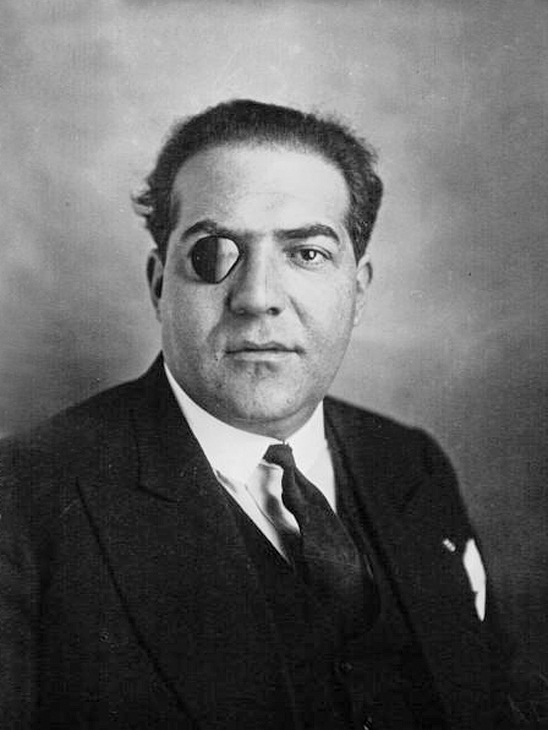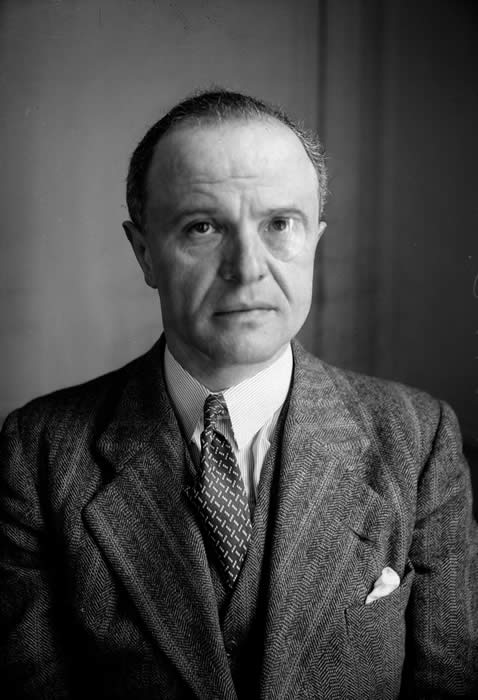<Back to Index>
- Commissioner General for Jewish Questions Xavier Vallat, 1891
- Commissioner for Jewish Affairs Louis Darquier de Pellepoix, 1897
PAGE SPONSOR

Xavier Vallat (July 7, 1891 - January 6, 1972), French politician, was Commissioner General for Jewish Questions in the wartime Vichy collaborationist government, and was sentenced after World War II to ten years in prison for his part in the persecution of French Jews.
Vallat was born in the department of Vaucluse into a family of conservative Catholics. In his youth he was active in Catholic organizations and joined the monarchist Action Française, the most important group on the extreme right of French politics. He became a teacher in Catholic schools before joining the French Army. In World War I he was severely wounded, losing his left leg and right eye. He was elected to the National Assembly for the Ardèche in 1919 as an "independent", who supported the National Bloc. He was defeated in 1924, re-elected in 1928 still as an "independent", and then served until the Assembly was suspended in 1940. He took membership however after the 1936 elections in the Republican Federation which was moving increasingly to the right.
In the 1930s Vallat was a leading representative of the Catholic, anti - Semitic extreme right in French politics. He was also anti - Protestant and anti - Masonic, arguing that Jews, Protestants and Masons were all part of a plot against Catholic France. He was violently opposed to liberalism, socialism and communism. Unlike many on the far right, however, Vallat did not favor restoration of the monarchy, and he was notably anti - German despite his sympathy for fascism. He favored the project for a Latin Bloc of France, Spain, Italy and Portugal.
In 1936 Léon Blum, a Jewish Socialist, became Prime Minister of France. Vallat made a series of personal rhetorical attacks in Blum, saying that "For the first time this ancient Gallo - Roman land will be governed by a Jew." Vallat was accused by the left of responsibility for the physical attack on Blum by a right wing mob in the streets of Paris which occurred not long after this speech.
After the German occupation of France in June 1940, Vallat supported the rise to power of Marshall Philippe Pétain at head of a collaborationist regime based in Vichy. In March 1941, he was appointed as head of the Commissariat General for Jewish Questions, a body set up to implement the anti - Semitic laws enacted by Pétain's government. In this position he oversaw the "Aryanization" of the French economy, education system, civil service and professions, and the enforcement of laws requiring all Jews to be registered with the police. As the historian Robert Paxton has demonstrated, these laws were passed by the Vichy regime on its own initiative and not under German pressure, as both Pétain and Vallat claimed at their trials after the war.
Although he was a zealous anti - Semite, Vallat was also a French patriot, and he became increasingly angry at the refusal of the Germans to reward Vichy's co-operation with a less restrictive occupation regime. He was particularly critical, as a veteran, of the German refusal to release almost two million French prisoners - of - war. As a result, the German Ambassador to Vichy, Otto Abetz, demanded that Pétain dismiss Vallat, which he did in May 1942. This meant that it was Vallat's successor, Louis Darquier de Pellepoix, who oversaw most of French co-operation with the German deportation of more than 70,000 French Jews to the extermination camp at Auschwitz, where most of them were killed.
Vallat remained a supporter of Vichy's policies, however, and in June 1944, when the Allied armies had already landed in Normandy, he was appointed head of the Vichy Radio following the assassination of Philippe Henriot by the Resistance. He broadcast regular anti - Semitic tirades until the Allies occupied Vichy in August.
At his trial before the High Court of Justice in December 1947, Vallat remained an unrepentant anti - Semite, demanding that one of the judges, Maurice Kriegel - Valrimont, be disqualified because he was Jewish. He denied direct responsibility for the deportations of the French Jews, claiming that his policies had saved more than half of the Jews from deportation. He falsely claimed that Vichy's anti - Jewish laws had been enacted on German orders. Vallat was sentenced to ten years in prison: the court said he received a relatively lenient sentence in the light of his service in World War I.
Vallat was released on parole in 1949 and amnestied in 1954. He returned to anti - Semitic agitation, although he found few followers in postwar France. From 1962 to 1966 he was editor of the extreme right wing journal Aspects de la France.
When Vallat died in January 1972, the Nazi hunters Serge and Beate Klarsfeld created a sensation by arriving at his funeral with a large wreath in the shape of a yellow Star of David, the symbol that French Jews had been forced to wear by the Nazis (although this measure had in fact been opposed by the Vichy government and was not enforced in the Vichy controlled zone).

Louis Darquier, better known under his assumed name Louis Darquier de Pellepoix (December 19, 1897, Cahors – August 29, 1980, near Málaga, Spain) was Commissioner for Jewish Affairs under the Vichy Régime.
A veteran of World War I, Darquier had been active in Fascist and antisemitic politics in France in the 1930s, being a member, at various times, of Action Française, Croix - de - Feu and Jeunesses Patriotes. On February 6, 1934, he was injured at the Place de la Concorde riot, and, according to the Janet Maslin, writing in The New York Times in 2006, "parlayed (his) new status as a 'man of 6 February' into a leadership role." During this period he began collaborating with the noted antisemitic publisher Ulrich Fleischhauer's Welt - Dienst (World - Service or Service Mondial) organization based in Erfurt, Germany.
Darquier's extreme views were well publicized. In 1937, he said, at a public meeting, "We must, with all urgency, resolve the Jewish problem, whether by expulsion, or massacre." A British report in 1942 called him "one of the most notorious anti - semites in France". At Nazi Germany's behest, he was appointed to head Vichy's Commissariat General aux Questions Juives (Office for Jewish Affairs) in May 1942, succeeding Xavier Vallat, whom the SS in France found too moderate. Darquier's ascendancy to this post immediately preceded the first mass deportations of Jews from France to concentration camps. He was fired in February 1944 when, in Nicholas Fraser's words, "his greed and incompetence could no longer be countenanced."
He was sentenced to death in absentia in 1947 by the French High Court of Justice for collaboration. However, he had fled to Spain, where members of the authoritarian regime of Francisco Franco, specifically General Antonio Barroso y Sánchez - Guerra, protected him.
In 1978, a French journalist interviewed him. Among other things, Darquier declared that in Auschwitz, gas chambers were not used to kill humans, but only lice, and that allegations of killings by this method were lies by the Jews. The interview was printed in L'Express and started off an instantaneous scandal. The extradition of Darquier was considered, but was refused by Spain.
The English psychiatrist Anne Darquier was his daughter by his Australian wife, Myrtle Jones. She was abandoned by her parents as a child in the 1930s when she was left with a London nanny.